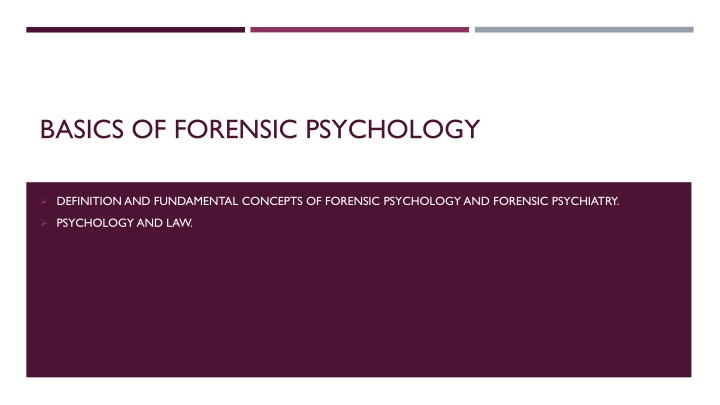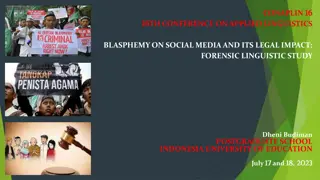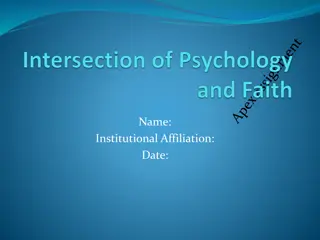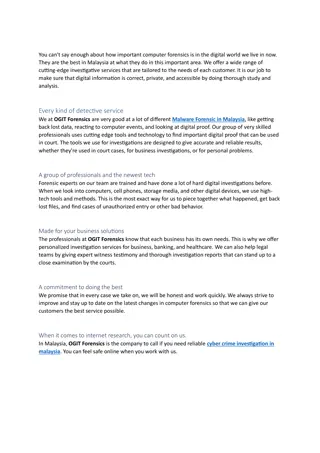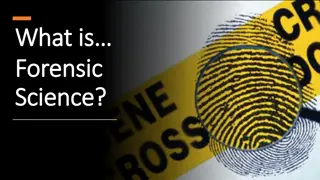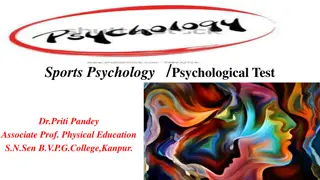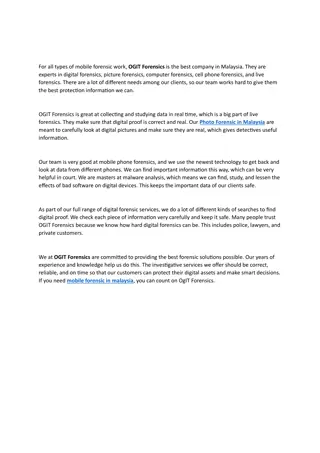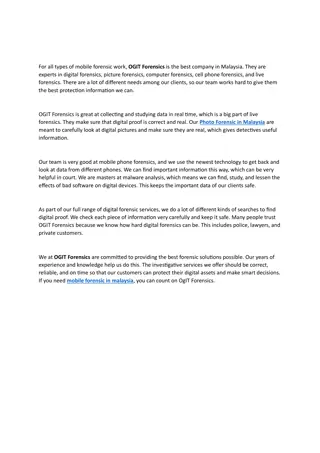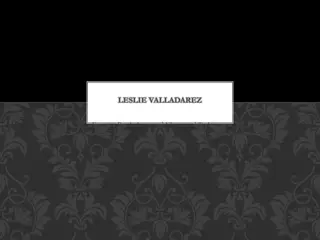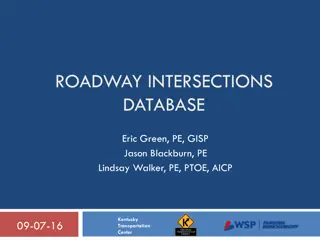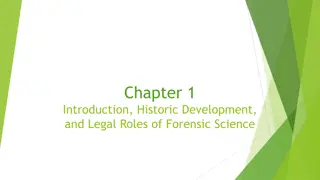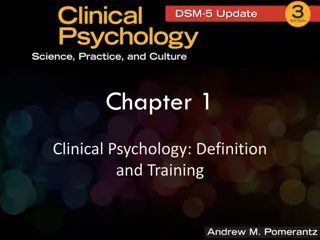Introduction to Forensic Psychology and its Intersection with Law
Forensic psychology and psychiatry involve applying psychological principles to legal matters, including competency evaluations and crime scene reconstruction. Forensic psychiatrists, with medical training, assess suspects, victims, and witnesses, while forensic psychologists, with expertise in psychology, analyze mental health conditions in the legal system. They play essential roles in determining criminal responsibility and conducting psychological crime reconstructions.
Download Presentation

Please find below an Image/Link to download the presentation.
The content on the website is provided AS IS for your information and personal use only. It may not be sold, licensed, or shared on other websites without obtaining consent from the author.If you encounter any issues during the download, it is possible that the publisher has removed the file from their server.
You are allowed to download the files provided on this website for personal or commercial use, subject to the condition that they are used lawfully. All files are the property of their respective owners.
The content on the website is provided AS IS for your information and personal use only. It may not be sold, licensed, or shared on other websites without obtaining consent from the author.
E N D
Presentation Transcript
BASICS OF FORENSIC PSYCHOLOGY DEFINITION AND FUNDAMENTAL CONCEPTS OF FORENSIC PSYCHOLOGY AND FORENSIC PSYCHIATRY. PSYCHOLOGY AND LAW.
DEFINITION AND FUNDAMENTAL CONCEPTS OF FORENSIC PSYCHOLOGY AND FORENSIC PSYCHIATRY. Behavioural Forensic Sciences: Applications of psychology and psychiatry to criminal matters including competency, interrogation, and crime scene reconstruction. As long as there has been crime, people have talked about responsibility. If a person is truly insane, can they be held responsible for committing a crime? Forensic psychiatrists and psychologists examine defendants and render expert opinions to courts. Both have a role to play in determining responsibility for committing crimes.
Forensic Psychiatry Psychiatry is a medical specialty attained by medical doctors. Deals with evaluation, diagnosis and treatment of Suspect/Victim/Witness. Requires research and clinical experience which is applied to legal issues such as civil, criminal or correctional matters. Can also testify about physical aspects of mental disorders including their biological basis, psychotherapeutic considerations etc. Requires MD in medicine. Forensic Psychology Psychology is a behavioural science that does not involve medical training. Deals with human mind and its effects on human behaviour. Have training and expertise in statistical analysis and psychological testing. Evaluate mental health conditions and disorders and apply to the criminal justice system. Determine trial competency for defendants or witnesses. Apply psychological theory and practice to criminal, court and correction systems. PhD in psychology or a Doctor of Psychology (PsyD)
Forensic psychologists play other roles in the criminal justice system : Psychological Crime Reconstruction. Serial killers and others who commit multiple crimes develop habits and traits that show up time after time as they commit crimes. Discovering and understanding these patterns can help lead investigators to the right suspect.
PSYCHOLOGY AND LAW The American Society of Psychology and Law The field of psychology and law suggests the application of scientific and professional aspects of psychology to questions and issues related to law and the legal system. A Field that covers contributions conducted in a number of different areas (research, clinical practice, public policies and teaching / training) of a variety of orientations within the field of psychology, such as development, social, cognitive and clinical.
Law embodies the theories of behaviour. What causes people to act the way they do. Laws , procedures and doctrines reflect the basic assumptions of human nature. Psychology helps decision makers in making decisions by providing accurate human perceptions and preferences. Helps to check the veracity of witnesses, as eyewitnesses can be easily influenced. Psychological studies include the examination of different areas which have legal and social significance. Pronouncing judgements considering the psychological aspects of the accused s mind ensures justice in its real meaning. There are two units of psychology which influence law and justice: legal psychology and forensic psychology, which together form psychology and law.
Deals with cognitive and social principles and their usage in the legal system. Psychological research of law along with legal institutions. Plays an advisory role in court systems. Trial consultants play different roles such as picking up the jurors, performing mock trials,etc Policy making and legislative guidance Helpful in testifying the witnesses. They also test the memory of eye witnesses. Legal Psychology Forensic Psychology Applying psychology in understanding crimes and other legal concerns. Forensic psychologist particularly testifies the competency of the defendant. Assessment of mental condition Prediction of violence and risk management Assessment of Child Custody in Divorce cases Competency to stand trial
https://blog.ipleaders.in/psychology-and-law/ https://www.lawteacher.net/free-law-essays/criminal-law/the-relationship-between-psychology-and-the-law- 2023.php
